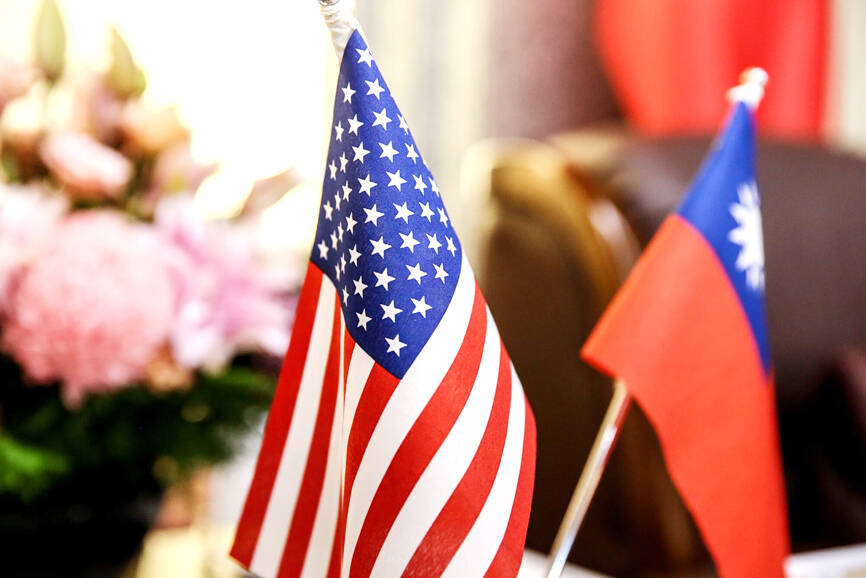The first agreement under the US-Taiwan Initiative on 21st Century Trade officially came into effect yesterday, marking a “significant milestone” in bilateral trade relations, the Office of Trade Negotiations said yesterday.
The agreement between Taiwan and the US covers commitments to customs administration and trade facilitation, regulatory practices, rules for running domestic service industries, anti-corruption, and small and medium-sized enterprises.
Both sides will continue to discuss implementation details and share any concerns, the office said in a statement.

Photo: I-Hwa Cheng, Bloomberg
This includes the establishment of committees on issues such as trade facilitation and good regulatory practices, as well as a liaison mechanism for small and medium-sized enterprises to ensure communication and coordination.
The Office of the US Trade Representative (USTR) also issued a statement on Monday confirming that the initial agreement had come into force.
“We thank our Taiwan partners for helping us reach this important milestone. The entry into force of the first agreement under our 21st Century Trade Initiative represents an important step forward in strengthening the US-Taiwan economic and trade relationship,” US Trade Representative Katherine Tai (戴琪) said in the statement.
The USTR previously submitted a certification to the US Congress stating that Taiwan had taken the measures necessary to comply with its obligations under the agreement, the statement said.
Both sides had notified each other that all procedures required for the agreement to enter into force had been completed, it said.
The US and Taiwan have been making progress on a second agreement under the US-Taiwan Initiative on 21st Century Trade, it said.
That agreement would address areas including labor, the environment and agriculture, and negotiations are ongoing, it said.
Taiwan’s trade office said the agreement had received unanimous support from Taiwan and the US Congress.
The two political parties in the US reviewed and approved it without objection in July, giving the agreement the status of an administrative agreement in the US Congress. That status made the legal basis for economic and trade exchanges between Taiwan and the US more solid, the trade office said.
To ensure that both nations can implement the agreement, the US Congress also approved the US-Taiwan Initiative on 21st Century Trade First Agreement Implementation Act in July last year following the passage of the first agreement, it said.
Taiwan and the US launched the Initiative on 21st Century Trade on June 1, 2022.
The first agreement under the initiative is an important “building block” toward a future free-trade agreement, the Office of Trade Negotiations said in May last year, calling it the “most comprehensive” deal agreed between the two trading partners since 1979.
Speaking to the media yesterday before attending a forum with business leaders, Premier Cho Jung-tai (卓榮泰) described it as a “significant day” for Taiwan-US relations.
He said it reflects both sides’ commitment to strengthening cooperation while deepening a broad range of ties.

Right-wing political scientist Laura Fernandez on Sunday won Costa Rica’s presidential election by a landslide, after promising to crack down on rising violence linked to the cocaine trade. Fernandez’s nearest rival, economist Alvaro Ramos, conceded defeat as results showed the ruling party far exceeding the threshold of 40 percent needed to avoid a runoff. With 94 percent of polling stations counted, the political heir of outgoing Costa Rican President Rodrigo Chaves had captured 48.3 percent of the vote compared with Ramos’ 33.4 percent, the Supreme Electoral Tribunal said. As soon as the first results were announced, members of Fernandez’s Sovereign People’s Party

EMERGING FIELDS: The Chinese president said that the two countries would explore cooperation in green technology, the digital economy and artificial intelligence Chinese President Xi Jinping (習近平) yesterday called for an “equal and orderly multipolar world” in the face of “unilateral bullying,” in an apparent jab at the US. Xi was speaking during talks in Beijing with Uruguayan President Yamandu Orsi, the first South American leader to visit China since US special forces captured then-Venezuelan president Nicolas Maduro last month — an operation that Beijing condemned as a violation of sovereignty. Orsi follows a slew of leaders to have visited China seeking to boost ties with the world’s second-largest economy to hedge against US President Donald Trump’s increasingly unpredictable administration. “The international situation is fraught

MORE RESPONSIBILITY: Draftees would be expected to fight alongside professional soldiers, likely requiring the transformation of some training brigades into combat units The armed forces are to start incorporating new conscripts into combined arms brigades this year to enhance combat readiness, the Executive Yuan’s latest policy report said. The new policy would affect Taiwanese men entering the military for their compulsory service, which was extended to one year under reforms by then-president Tsai Ing-wen (蔡英文) in 2022. The conscripts would be trained to operate machine guns, uncrewed aerial vehicles, anti-tank guided missile launchers and Stinger air defense systems, the report said, adding that the basic training would be lengthened to eight weeks. After basic training, conscripts would be sorted into infantry battalions that would take

GROWING AMBITIONS: The scale and tempo of the operations show that the Strait has become the core theater for China to expand its security interests, the report said Chinese military aircraft incursions around Taiwan have surged nearly 15-fold over the past five years, according to a report released yesterday by the Democratic Progressive Party’s (DPP) Department of China Affairs. Sorties in the Taiwan Strait were previously irregular, totaling 380 in 2020, but have since evolved into routine operations, the report showed. “This demonstrates that the Taiwan Strait has become both the starting point and testing ground for Beijing’s expansionist ambitions,” it said. Driven by military expansionism, China is systematically pursuing actions aimed at altering the regional “status quo,” the department said, adding that Taiwan represents the most critical link in China’s